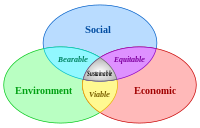
Photo from wikipedia
Sustainable closed-loop supply chains have attracted attention due to environmental protection problems and resource shortages. The quality of recycled products is an important factor in reverse logistics. Based on Stackelberg… Click to show full abstract
Sustainable closed-loop supply chains have attracted attention due to environmental protection problems and resource shortages. The quality of recycled products is an important factor in reverse logistics. Based on Stackelberg game theory, we propose two sustainable closed-loop supply chain models: a centralized decision model and a decentralized decision model, and assume that the manufacturer considers the recycling quality level of used products. We compare the differences in the optimal decisions from different decision-makers and analyze the influence of relevant parameters on these decisions in a sustainable closed loop supply chain. From the comparative analysis and numerical analysis, it was observed that the model yields the best decision result and carbon emission reduction level under the centralized decision condition. The recycling quality level is found to be higher in the centralized decision model than in the decentralized decision model, and the sales price is found to be lower in the centralized decision model than in the decentralized decision model. Moreover, the impacts on the carbon emission reduction level, the recycling quality level, and corporate profit are found to be related to the carbon emission preference coefficient of consumers, the recycling effort cost coefficient, and the carbon emission investment cost coefficient.
Journal Title: Applied Ecology and Environmental Research
Year Published: 2019
Link to full text (if available)
Share on Social Media: Sign Up to like & get
recommendations!